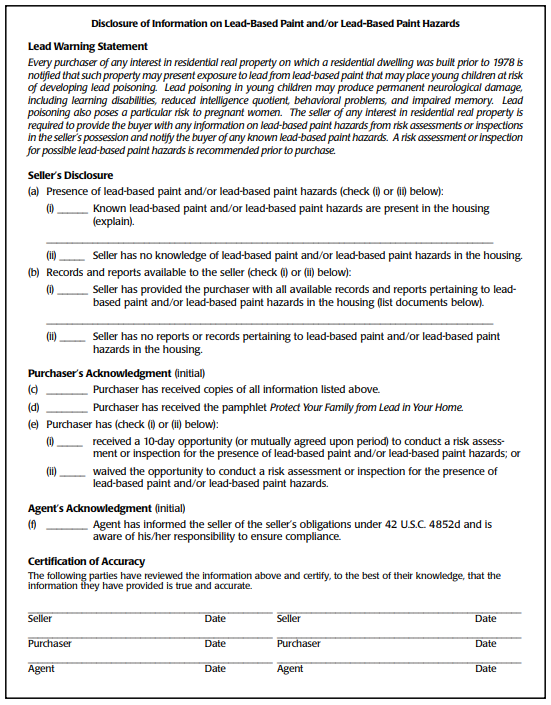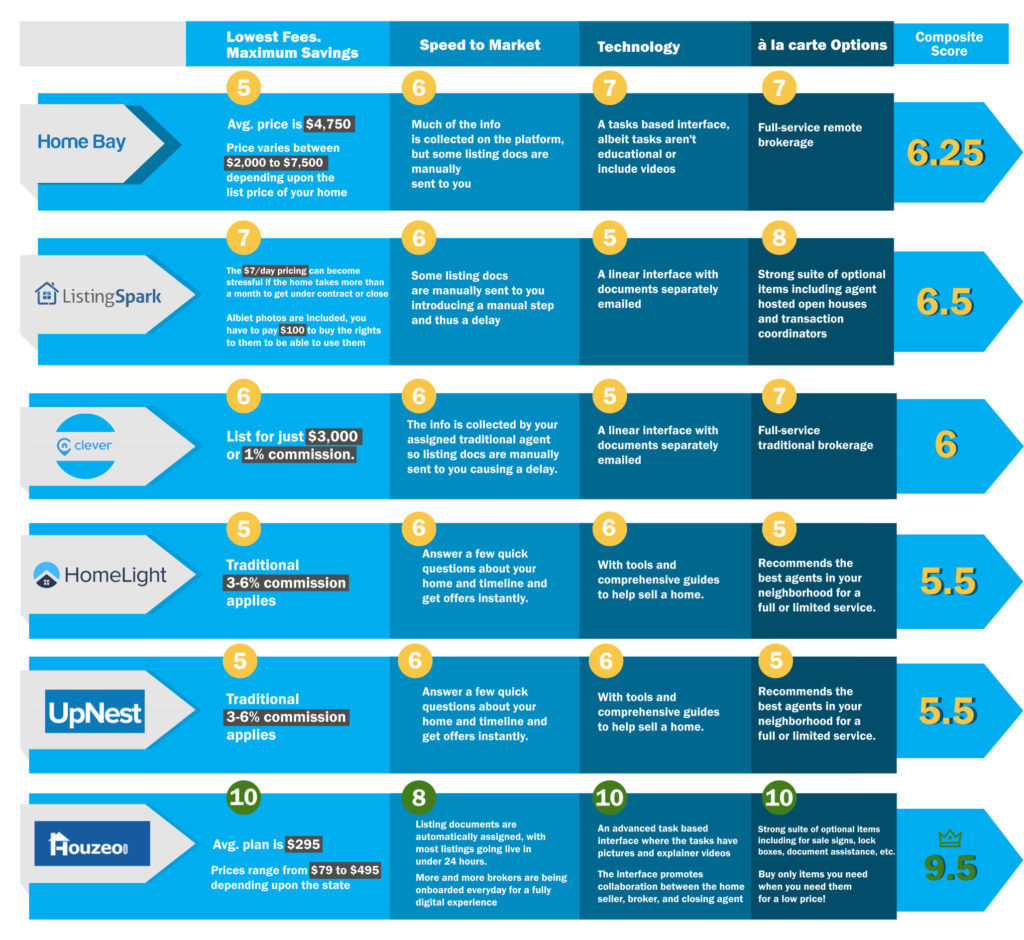Selling a property can be quite an arduous task. While it’s also crucial to prepare your home to look appealing, it’s just as important to learn how to prepare for your closing. Remember, different real estate rules vary from countries and states. However, like most of the states, the Indiana law requires home sellers to disclose any known major defects before closing.
» How To Sell My House Indiana: Know the process to sell your home in Indiana.
Seller Disclosure Requirements in Indiana You Need to Know:
- Federal Disclosure of Information on Lead-Based Paint and/or Lead-Based Paint Hazards
- General Seller Disclosure Requirements in Indiana
» How Do I Sell My House As Is Indiana: Here is Houzeo’s guide on how to sell your home as-is in Indiana.
Federal Disclosure of Information on Lead-Based Paint and/or Lead-Based Paint Hazards

The Residential Lead-Based Paint Hazard Reduction Act passed in 1992 requires the disclosure of any lead-based paint or chipped paint in any housing built before 1978.
Lead paint can cause serious major health risks. The Residential Lead-Based Paint Hazard Reduction Act requires sellers to provide details about lead paint (lead from paint, dust, and soil, or lead poisoning) before selling the property. Moreover, if you want to know more about the harmful effects of lead, you can read the Indiana Lead and Healthy Homes Program (rules and federal regulations). You can also review and read about the Lead-Based Paint: The Law in Indiana to know more about issues concerning lead hazards in Indiana.
The seller should inform the buyer about the lead-based paint hazards and provide 10 days for the buyer to do a risk assessment or paint inspection for lead-based paint or lead-based paint hazards. For safety purposes, the homebuyers may look for a lead hazard inspection firm by following this link.
» Sell My House For Cash Now: Check out the best options to sell your Indiana home fast for cash
Seller’s Residential Real Estate Disclosure
Further Indiana’s Residential Real Estate Disclosure Law says, Ind. Code §32-21-5-2 sellers are obligated to comply with the standard disclosure form. In this form, sellers need to disclose any known material defects in the house—structure and other systems that could affect the buyer’s decision. Also, the form must be based on the seller’s current actual knowledge about the property’s condition such as lead-based paint, flooding, cracked floors, damaged ceiling, and even appliances.
The disclosure form must not be treated as a contract deal, but simply a document to protect the buyer from any fraud—and must-known major defects that could change the property’s value. The form has included different conditions that the seller should answer honestly whether it’s “None/Not Included/Rented, Defective, Not Defective, or Do Not Know”.
Here, it is clearly stated in the form that the “Defect means a condition that would have a significant adverse effect on the value of the property, that would significantly impair the health or safety of future occupants of the property, or that if not repaired, removed or replaced would significantly shorten or adversely affect the expected normal life of the premises.” Nonetheless, the buyer has the right to perform an inspection of the property to verify the form and the home’s condition.
In the state of Indiana, however, sellers aren’t required to disclose paranormal, suicide, natural death and such about the property. For example, it’s unnecessary to notify the new homeowner about previous occupants who have suffered from HIV or AIDS. Indiana’s Residential Real Estate Disclosure Law, Ind. Code §32-21-5-2 only requires sellers to complete the form which contains property condition defects. It clearly does not mention any statements about the supernatural of that sort.
As a seller and as the only source of all the information in this form, here are the statutory seller disclosure requirements in Indiana you are obliged to state:
- Appliances
- Electrical System
- Water and Sewer System
- Heating and Cooling System
- Roof leak
- Hazardous Conditions
- Methane gas, lead paint, radon gas, radioactive material, and other biological contaminants
- Manufacture of methamphetamine in a residential property
Other Disclosures:
- Encroachments
- Structural Foundation
- Zoning violations, building codes, or restrictive use
- Water problems in the basement
- Wood destroying insects
- Furnace/Woodstove/Chimney/Flue issues
- Threatened or existing litigation

» How To Sell My House Faster Indiana: Read our blog if you’re in dire need to sell your house fast in Indiana.
What if the seller fails to disclose any of this information to the buyer?
In case such as failure to truthfully completing the Seller’s Residential Real Estate Disclosure Form, the buyer could take legal action against the seller for committing fraud or to liability for misrepresentation. For instance, the seller intentionally hides the sewer system defects and did not tell the agent or the buyer. The seller, in the said circumstance, must pay actual damages and attorney’s fees hired by a buyer in pursuing a lawsuit against the seller.
To avoid serious legal trouble, it’s advised to carefully complete the form and review each section before filling in the checkboxes. Litigation is not only a costly process but could void the sale under such circumstances. Contact your real estate attorney or agent if you have doubts. Seek a professional opinion or advice.
» Can I Sell My House By Myself Indiana: Are you considering selling you house without a realtor? Here are our tips for a smooth selling process.
Note: All the information mentioned above is just a guide for real estate sellers in Indiana. It is still best to seek legal advice from experts if you have any clarifications.



Tips to Minimize Issues in Indiana Disclosure Documents
| Review And Verify | There’s a time allowance (some permit 10 days) to review and verify everything about your Purchase and Sales Agreement—also the square footage, home usage, and marketing. |
| Ask Questions | Ask questions when in doubt. This would help you in avoiding future troubles. |
| Hire A Professional Inspector | A professional inspector can help you gather backup information about the property’s condition. You can also opt for a pre-inspection before listing. » Find out the best home inspectors in Indiana. |
| Disclose Everything | To avoid problems in your home disclosure statement disclose everything you know honestly. Even though it’s a minor issue, you must disclose it. |
| Get A Licensed Agent Involved | The best way to avoid disclosure issues is to get a licensed a real estate agent. Agents can help you manage and assist you in the process along the way. |
Indiana Seller’s Disclosures are a little complicated. Selling your house FSBO is usually good, but then you would have to deal with all the disclosures on your own. This demands that you be aware of all the seller disclosure requirements in Indiana and that any mistake can cost you dearly. Houzeo can help you with this.
- ✍️ Editor’s Note: Though selling your home yourself on a For Sale By Owner website can save you thousands in commission, we highly recommend you add a Flat Fee MLS listing to your marketing strategy. Check out the best Indiana Flat Fee MLS.
» IN Flat Fee MLS – Discover The Best Flat Fee MLS Service in Indiana
Conclusion
By listing your property with Houzeo, you get access to all forms in electronic format. And that too, for FREE! Houzeo has segregated all the disclosures state-wise so that you don’t have to hunt for seller disclosure requirements in Indiana separately.
Check out some of the Houzeo reviews and how it has helped customers around the US.
Also Read:
- Cash Buyers in Indiana – Find out the companies in Indiana that buy homes for cash.
- Indiana Home Staging – Read our blog to know helpful tricks to make your house attractive to buyers.
- Average Closing Cost in Indiana– Know how much are closing costs in Indiana.
- Who Pays Closing Costs in Indiana– Buyer or Seller? Read more to know who generally pays the closing cost in Indiana.
- Is Title Insurance A Scam in Indiana– The expanding market reflects how new homeowners want to protect their investment years after closing. But what exactly is title insurance? Let’s find out!
- Top Real Estate Companies in Indiana– Here’s our compiled a list of the top 10 real estate companies in Indiana.
- Best Time of Year to Sell A House in Indiana– Find out the best time to sell your property in Indiana.
For IN Seller –
- How Much Are Closing Costs in IN For Seller– Find out seller’s closing costs obligations in Indiana.
- Seller Closing Costs Calculator Indiana– Here’s Houzeo’s closing cost calculator for the seller.
For IN Buyer-
- How Much Are Closing Costs For Buyers in IN– Find out buyer’s closing costs obligations in Indiana.
- Indiana Buyer Closing Cost Calculator – Here’s Houzeo’s closing cost calculator for the buyer.
Keywords: disclosure rule, required to disclose, disclosure of information, information on lead based, disclosure statements, united states, protect your family from lead in your home, lead hazard information, epa approved information pamphlet, material defects, seller disclosure statement, property disclosure, lead based paint disclosure, paint hazard reduction act, residential property disclosure act, residential lead based paint and or lead based paint hazards reduction act of 1992, indiana residential property disclosure, based paint hazard reduction, real estate agent, disclosure form, seller disclosures, seller disclosures in indiana, indiana federal lead-based paint, all cash offers house, taxes on selling inherited property in indiana, real estate photography in indiana, how to stop foreclosure sale in indiana
Uncategorized









.webp)
